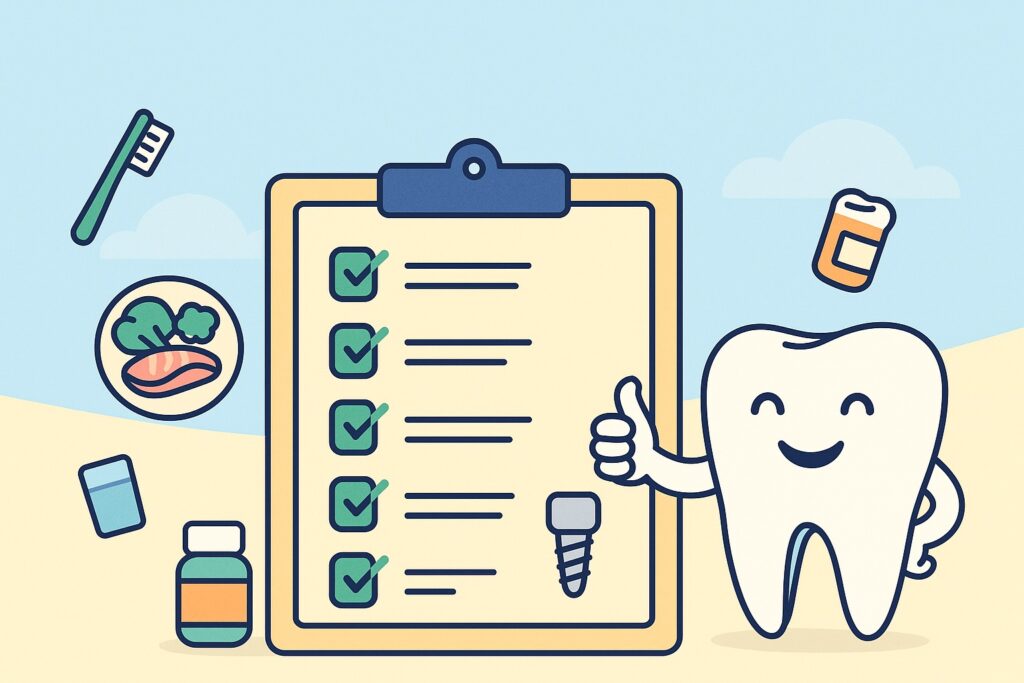Dental implants offer a long-term solution for replacing missing teeth, but their success heavily depends on how well you prepare before surgery. From initial evaluations to day-of-surgery readiness, every step plays a role in reducing risks, speeding up recovery, and ensuring the implant integrates properly with the jawbone. Whether this is your first procedure or one of several, understanding what to expect and how to plan can significantly improve your overall experience.
1. Initial Dental Evaluation and Medical Review
Before scheduling the implant procedure, your dentist or oral surgeon will conduct a comprehensive evaluation. This step is crucial to determine whether you’re a suitable candidate for dental implants and to minimize the risk of complications during and after surgery.
Dental Imaging and Oral Examination
You’ll likely undergo digital X-rays or 3D cone beam CT scans to assess the condition of your jawbone, remaining teeth, and surrounding structures. These images help plan the precise placement of the implant and identify if bone grafting is needed.
Medical History Review
Your provider will review your full medical history, including any chronic conditions like diabetes, heart disease, or autoimmune disorders that could affect healing. Be honest about any past surgeries or complications, and share a list of all medications and supplements you’re taking.
Identifying Risk Factors
Certain lifestyle factors and health conditions—such as smoking, uncontrolled diabetes, or advanced gum disease—can reduce implant success. Your dentist may recommend lifestyle adjustments or pre-treatment, such as periodontal therapy or bone grafting, to improve your chances of a successful outcome.
2. Pre-Surgery Instructions from Your Dentist or Oral Surgeon
Once your procedure is scheduled, your dental team will provide detailed instructions to follow in the days leading up to surgery. These are designed to ensure your safety during the procedure and support a smooth recovery.
Fasting Guidelines
If you’ll be under sedation or general anesthesia, you’ll likely be asked to avoid eating or drinking anything (including water) for 6–8 hours before surgery. Local anesthesia alone may not require fasting, but always confirm with your provider.
Medication Adjustments
Let your dentist know about all current medications, especially blood thinners, diabetes medication, or immune-suppressing drugs. You may need to pause or adjust these under the guidance of your doctor. In some cases, you’ll be prescribed antibiotics to take before surgery to lower the risk of infection.
Oral Hygiene Instructions
Maintaining a clean oral environment is essential. You may be advised to brush and floss thoroughly the night before and morning of the surgery, avoiding the surgical site if it’s already sensitive. Some dentists recommend using an antimicrobial mouth rinse like chlorhexidine to reduce bacteria.
Following these instructions carefully helps prevent complications like infection, excessive bleeding, or delayed healing.
3. Planning for the Recovery Period
Preparing for your recovery in advance can make the healing process smoother and more comfortable. Dental implant surgery is typically an outpatient procedure, but proper planning is essential for minimizing downtime and discomfort.
Time Off Work or School
Depending on the number of implants placed and whether bone grafting was involved, you may need 1 to 3 days off for initial recovery. Some patients feel well enough to return to routine activities the next day, while others prefer extra rest time, especially if sedation was used.
Stock Up on Soft Foods and Supplies
In the first few days after surgery, your diet will be limited to soft, non-irritating foods like yogurt, mashed potatoes, smoothies, and soups. Avoid hot, spicy, or crunchy foods. It’s also wise to have cold packs, prescribed pain medication, and gentle mouth rinses ready before your procedure.
Arrange Transportation and Support
If you’re undergoing sedation or anesthesia, you’ll need someone to drive you home. It’s also helpful to have a friend or family member available for the first few hours post-surgery in case you need assistance with meals, medication, or mobility.
4. Mental and Physical Preparation
Dental implant surgery can trigger anxiety or concern for many patients, especially if it’s their first time. Taking steps to prepare mentally and physically can improve both your surgical outcome and emotional comfort.
Managing Anxiety and Dental Fear
If you’re nervous about the procedure, talk to your dentist ahead of time. Many clinics offer sedation options, from mild oral sedatives to IV sedation, to help you stay calm. Breathing techniques, guided meditations, or even listening to calming music before and after your appointment can also help ease stress.
Lifestyle Adjustments Before Surgery
If you smoke, quitting is one of the most important steps you can take. Smoking significantly reduces blood flow and oxygen to the tissues, impairing healing and increasing the risk of implant failure. Your dentist may ask you to stop at least 1–2 weeks before and after surgery.
For those with diabetes, work with your physician to keep your blood sugar well-controlled. Uncontrolled diabetes can slow down healing and increase infection risk. Staying hydrated, eating balanced meals in the days before, and avoiding alcohol or excessive caffeine are also smart choices.
Get Plenty of Rest
Try to get a full night of sleep before the procedure. Your body heals more efficiently when it’s well-rested. Avoid heavy physical activity or anything that might raise your stress levels the day before your surgery.
5. What to Wear and Bring on Surgery Day
On the day of your dental implant surgery, comfort and preparation are key. Wearing the right clothing and bringing essential items can make the experience smoother and more manageable.
Dress Comfortably
Wear loose, comfortable clothing that allows easy movement. If sedation or IV medications will be used, short sleeves or sleeves that can be rolled up easily are recommended. Avoid wearing makeup, especially around the mouth and eyes, as it may interfere with surgical visibility or adhesive monitoring devices.
Skip Jewelry and Contact Lenses
Remove any facial piercings, earrings, necklaces, or other jewelry before arriving. Also, if you wear contact lenses, switch to glasses for the day, especially if sedation is involved — your eyes may be closed for an extended period.
Bring Important Information and Support
Carry a list of all current medications, allergies, and any relevant medical documents. If you have a medical condition that requires pre-clearance or special accommodations, ensure your surgical team is informed ahead of time.
If anesthesia is involved, you’ll need a responsible adult to drive you home. Many clinics won’t perform the procedure without confirming you have someone available post-surgery.
Conclusion
Preparing for dental implant surgery involves more than just showing up on the day of the procedure. A thorough dental evaluation, following pre-surgery instructions, planning for recovery, and making necessary lifestyle adjustments can significantly improve your comfort and the success of the implant. By taking the time to prepare properly—mentally, physically, and logistically—you help ensure a smoother surgery and a faster, complication-free healing process.

